 Are you thinking about setting up an e-commerce website or making goods and services available for sale online? If so, then here’s a great idea: consider providing users with a currency conversion tool.
Are you thinking about setting up an e-commerce website or making goods and services available for sale online? If so, then here’s a great idea: consider providing users with a currency conversion tool.
Currency conversion lets your customers have the price of a foreign currency amount translated to their home currency at the point of sale. It also lets visitors and customers see the exact amount their card or PayPal account will be charged, displayed in their own local currency.
The obvious benefit of adding currency conversion to your site is that it allows visitors to view and understand pricing in foreign countries in their own home currency, making it it easier for purchasers to calculate their costs and expenses.
If your site is built with WordPress, it’s simple to add a currency conversion plugin to WordPress, allowing your prospective customers to quickly and easily determine the cost of your products.
Currencyr – Currency Converter For WordPress
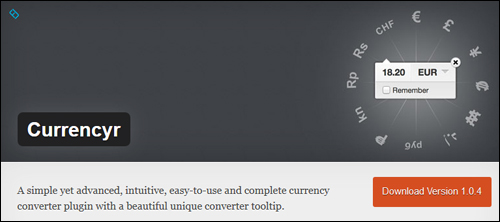
Currencyr is an intuitive, easy-to-use and complete currency converter WordPress plugin with a visually attractive converter tooltip. Best of all, it’s free!
Great plugin features include the following:
- In-line converter
- Supports a number of exchange rates providers, like Yahoo!, Google, Open Exchange Rates, European Central Bank and FoxRates
- WP-Cron task scheduler enabled
- Widgetized currency table and converter
- Can be integrated with a number of e-commerce plugins such as WooCommerce, Shop and Easy Digital Downloads.
- Automatically detects local currency
- Full language translation support
Important: The Currencyr plugin requires your server to be running PHP 5.3.0 or later. Do not install this plugin if you are running an older version of PHP. Ask your web host to upgrade your PHP server installation.
***
You can install the Currencyr plugin from your WordPress admin area by typing in “currencyr” into the Plugins search field and clicking “Install Now” …
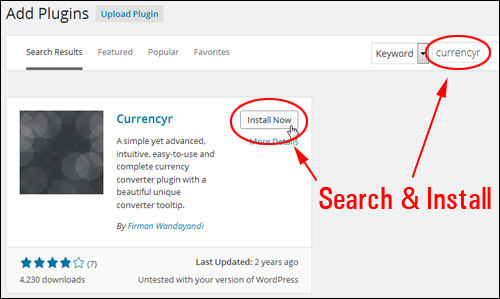
When you have installed and activated the plugin, you can configure the plugin’s settings by choosing Currencyr from your admin menu …
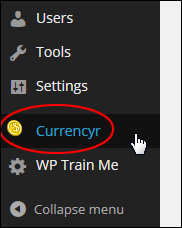
This takes you to the plugin settings section …
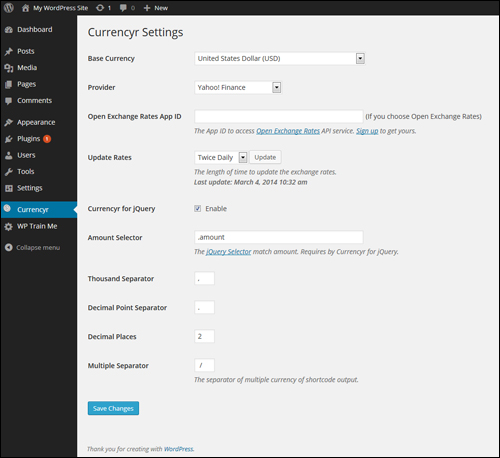
For example, you can select your base currency from the Base Currency dropdown menu. The default option is ’US Dollar’ …
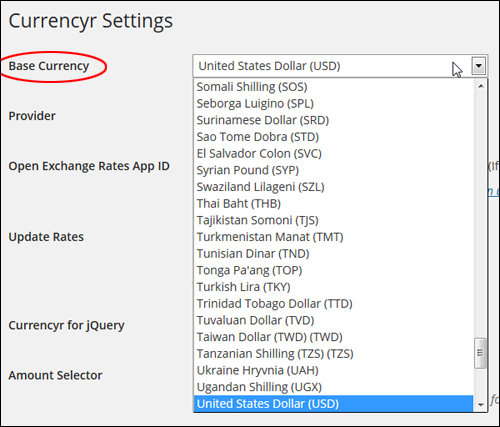
Similarly, you can specify a data provider from the drop-down menu in the Provider section. The default selection is Yahoo Finance, but you can also choose another option, such as European Central Bank or Open Exchange Rates …

Note: If you select Open Exchange Rates, you will need to enter an API (Application Programming Interface) ID …

You can select how frequently you would like the currency exchange rates to be updated by selecting an option from the Update Rates dropdown menu …

The plugin uses jQuery, which is an open-source library of Javascript code that allows web developers to add things like animation effects to web applications (such as WordPress plugins).
Unless there is a reason to edit the jQuery settings, you can just ignore this section …

Edit the remainder of the settings and click Save Changes when done …
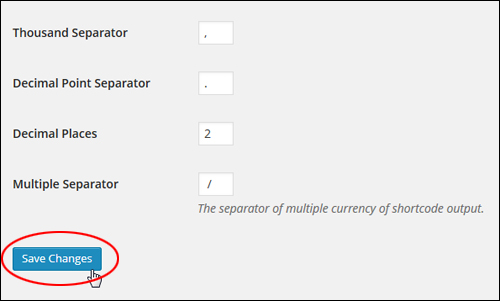
Once your plugin settings have been configured, you can start adding currency conversion to all of your WP posts using shortcodes and widgets.
Refer to the ‘Additional Plugin Notes’ section further below to learn how to use currency codes (e.g. USD, AUD, ZAR, etc …) with the Currencyr plugin.
Shortcodes
You can add currency conversion to WordPress posts, pages and widgets with no programming knowledge using shortcodes.
Let’s take a look at some examples of currency shortcodes that you can add to posts and pages:
Let’s say that you are selling your product for a set price (e.g. $175) in US Dollars (USD), and you want to show the amount converted into British pounds (GBP) on your page.
To display this information, you simply need to insert the following shortcode to your post or page …

Note: You can also add pricing in dollars and cents (for example, 155.25, 79.45, 149.00, etc …)
The example below shows how the shortcode looks when added to a post …
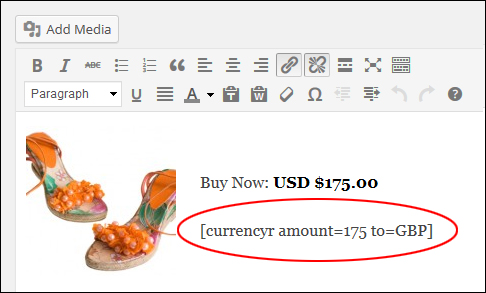
After your page or post has been published, your currency conversion will then display as shown in the screenshot below …
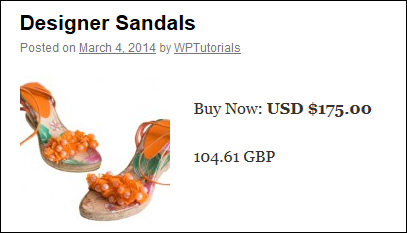
Using the above example, let’s now translate the same price into different currency formats.
To do this, use the shortcode shown below (you can add as many currency symbols as you like by using vertical pipes) …

You can see how the shortcode looks when you add it to a post …

Once your page has been published, the currency conversion will then display like this …
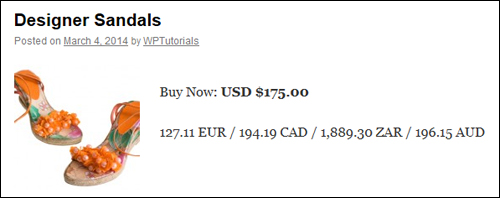
refer to the ‘Additional Plugin Notes’ section at the bottom of this tutorial to learn more about changing the currency separator symbol in the Currencyr plugin.
Now, let’s say that you want to select a different base currency than the one you have selected as the default.
For example, say you have specified your default base currency as EUR and you have a section on your site targeted to visitors from countries like Australia or Canada, you can change the base currency using the following shortcode …

You can see how the above shortcode looks when added to a page …
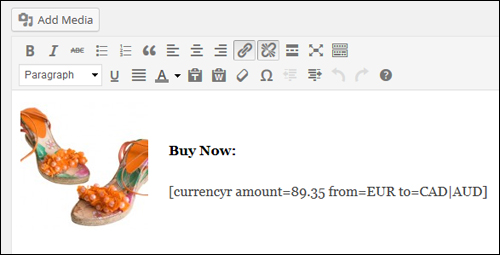
After publishing the post or page, the currency conversion will then appear as seen in the example below …
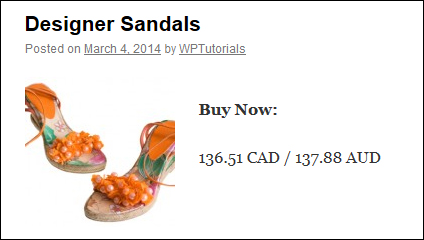
How To Use The Plugin Widget
You can also add a currency converter to your website’s sidebar menu using a widget.
To add the currency converter to your sidebar area, choose Appearance > Widgets in your WordPress dashboard menu …
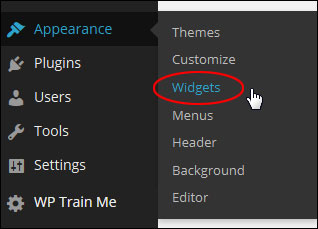
In the Widgets > Available Widgets section find the ‘Currencyr’ widget and drag it to an Active Widgets area …
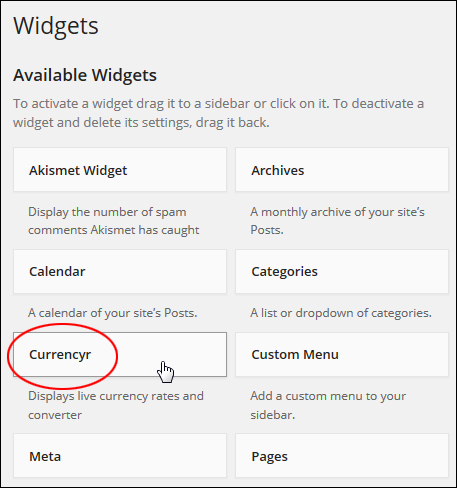
Configure the widget options as shown below (add currency codes separated by a comma), and click ‘Save’ to update your settings …
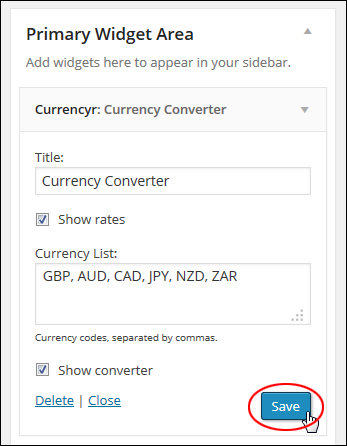
Your currency conversion tool will now appear on your sidebar with the settings you have specified when configuring the widget …
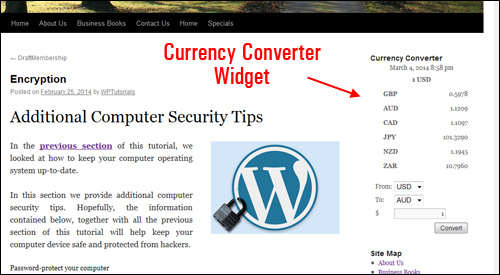
Additional Plugin Notes
Here are some additional notes and useful information about using the Currencyr plugin.
Currency Separator
The Currencyr plugin allows you to specify a symbol of your choice to display as the currency separator when using several currencies.
You can select a different symbol in the ‘Multiple Separator’ settings section.
So, for example, entering the default symbol “/” (forward slash) …

Separates all your currency amounts with the forward slash as you can see in the screenshot below …
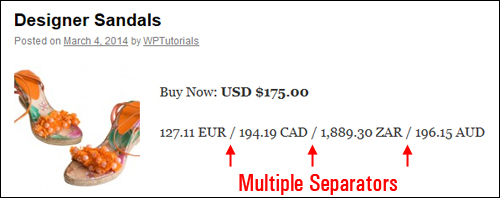
If you select another symbol and update your plugin settings …

Your site visitors will see the new symbol being used as the currency separator …
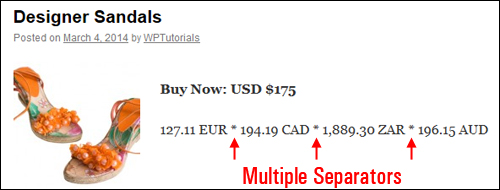
Integration With e-Commerce Platforms
As described earlier, the plugin can be integrated with various WP-compatible e-commerce plugins such as WooCommerce, WP-eCommerce and Easy Digital Downloads …
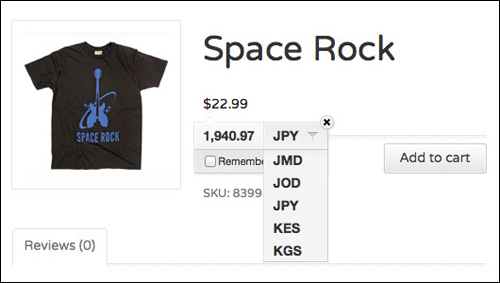
(above image sourced from plugin site)
And there you have it! Now you know how to easily add a currency converter to your e-commerce website.
To learn more about WordPress e-commerce plugins, see the tutorial below:
***
"Your training is the best in the world! It is simple, yet detailed, direct, understandable, memorable, and complete." Andrea Adams, FinancialJourney.org